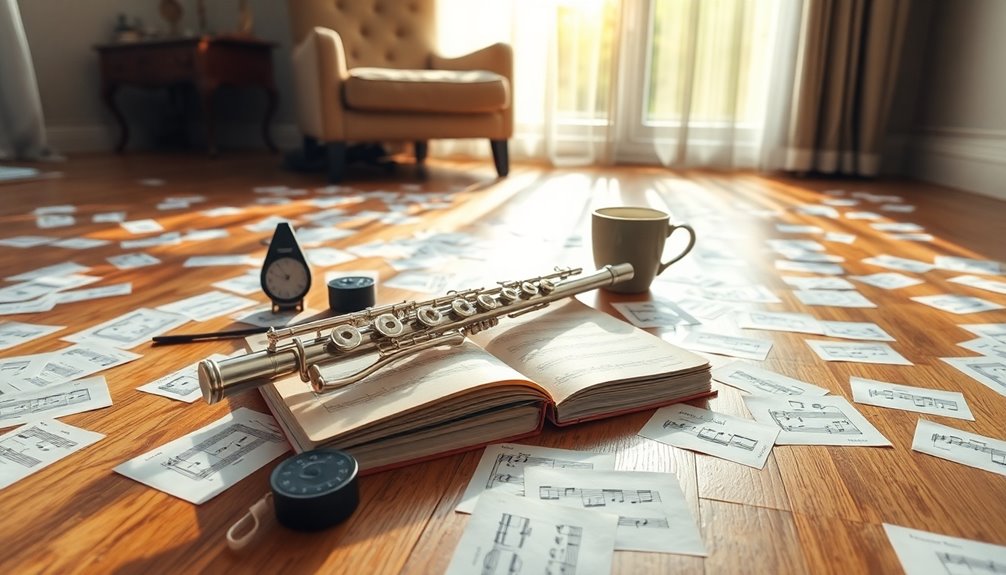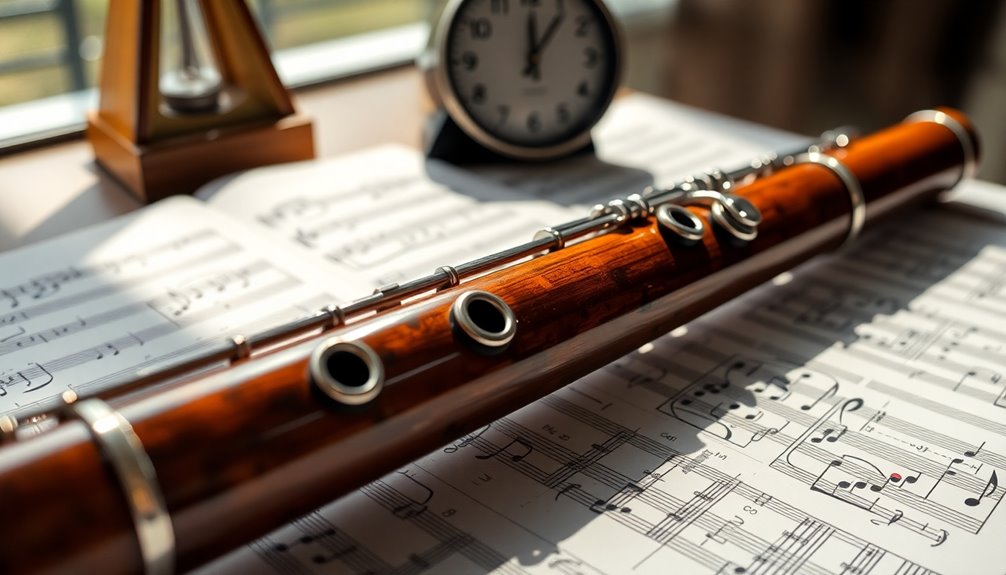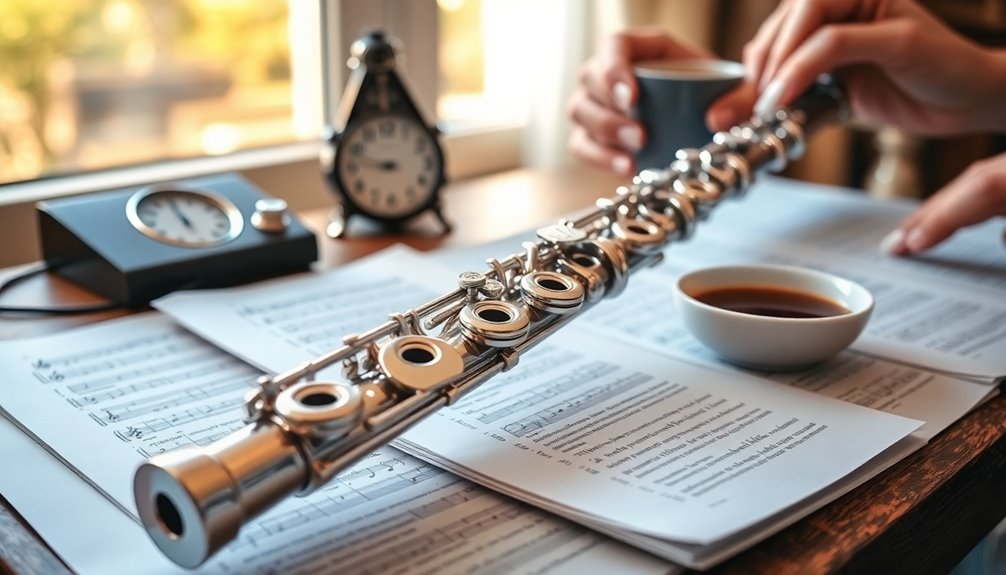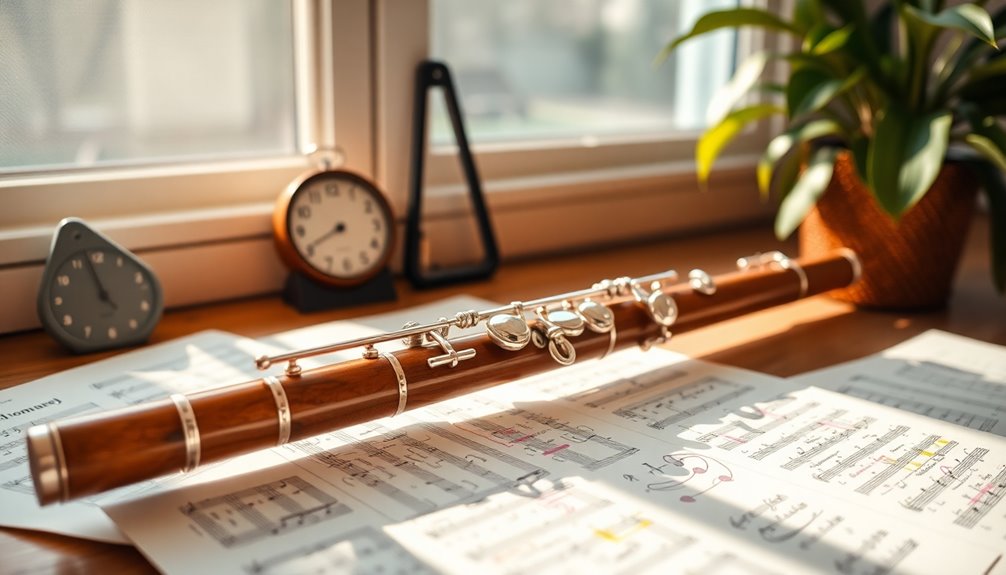To achieve success with your flute practice, start by setting clear, specific goals. Break these down into smaller tasks to keep you motivated. Incorporate consistent warm-up exercises like long tones and scale drills to build technical skills. Don't overlook repertoire selection; choose pieces that challenge you without overwhelming, and gradually tackle more difficult works. Ultimately, embrace feedback from peers or mentors to refine your skills. A structured approach, along with tracking your progress, can greatly enhance your musical growth. Keep these strategies in mind, and you'll discover even more ways to elevate your practice routine.
Key Takeaways
- Set clear, specific practice goals and track progress in a journal to enhance focus and commitment.
- Incorporate consistent warm-up exercises, such as long tones and scale drills, to build a strong technical foundation.
- Select a diverse repertoire that balances difficulty and personal resonance to maintain engagement and challenge.
- Actively seek feedback through peer reviews, self-assessments, and mentorship to identify areas for improvement.
- Utilize essential practice tools, including metronomes and instructional materials, to support skill development and accuracy.
Setting Your Practice Goals

Setting clear practice goals is essential for any flutist looking to improve their skills. When you set specific, achievable goals, you create a roadmap that guides your practice sessions. Start by identifying what you want to accomplish. Whether it's mastering a particular piece, improving your tone, or increasing your speed, having a clear focus will help you stay motivated and organized.
Goal setting isn't just about what you want to achieve; it's also about breaking those larger objectives into smaller, manageable tasks. For instance, if your goal is to learn a challenging piece, divide it into sections and set timelines for each. This way, you'll feel a sense of accomplishment as you complete each segment, keeping you engaged and excited about your progress.
Don't forget to incorporate progress tracking into your routine. Keeping a practice journal can be incredibly beneficial. You can jot down what you worked on, any challenges you faced, and how you overcame them.
Reflecting on your progress helps you see how far you've come and reinforces your commitment to your goals. Additionally, regularly assessing your performance can help identify areas for improvement that will enhance your practice effectiveness.
Warm-Up Exercises

With your practice goals clearly defined, it's time to focus on warm-up exercises that will prepare your body and mind for effective practice. A solid warm-up routine is essential for developing both breath control and finger agility, setting the stage for a successful session.
Start with long tones; they're great for improving your breath control. Choose a comfortable note and sustain it for as long as possible while maintaining a steady, even sound. This exercise helps you connect with your breath, ensuring you're relaxed and focused. Gradually move through your range, exploring different dynamics and articulations.
Next, incorporate scales and arpeggios. These exercises are fantastic for enhancing finger agility. Begin slowly, paying attention to your finger placement and ensuring clean, precise shifts. As you grow more comfortable, increase the tempo, but don't rush—accuracy is key.
Consider adding some lip slurs to your routine. These help you connect your breath with your finger movements while fostering flexibility in your embouchure. Experiment with different intervals, and challenge yourself to maintain a smooth sound throughout. Practicing these exercises regularly will not only improve your technique but also enhance your overall musical understanding of scales and arpeggios.
Finally, wrap up your warm-up with a few short pieces or exercises that you enjoy. This won't only solidify your technical skills but also make you feel more connected to your instrument and the music you love.
Technical Skill Development

As you immerse yourself in technical skill development, it's important to focus on building a strong foundation that enhances your overall flute playing. Developing your finger dexterity and mastering scale exercises won't only improve your technique but also increase your confidence as a musician.
Here are three key areas to concentrate on:
- Scale Exercises: Start with major and minor scales, ensuring you practice them in various octaves and articulations. This will help you familiarize yourself with different keys and improve your muscle memory.
- Finger Dexterity Drills: Incorporate specific exercises aimed at enhancing your finger speed and clarity. Try using a metronome to gradually increase your tempo. Simple patterns like finger lifts or chromatic scales can be particularly effective.
- Long Tones: While it may seem unrelated to finger skills, long tones will help you maintain control over your breath and improve intonation. Focus on sustaining notes while varying dynamics, which will indirectly aid your technical precision. Additionally, practicing sustained notes can enhance your overall tone quality and embouchure development.
Repertoire Selection

Selecting the right repertoire is essential for your growth as a flutist, and it can make a significant difference in your practice routine. When choosing pieces, consider incorporating genre variety into your selection. Exploring different styles—be it classical, jazz, or contemporary—can enhance your musicality and keep your practice sessions engaging. Each genre offers unique challenges and opportunities for expression, allowing you to develop a well-rounded skill set.
Next, think about the difficulty levels of the pieces you select. It's important to strike a balance between pushing your limits and ensuring you're not overwhelmed. Start with pieces that challenge your current abilities while still being manageable. Gradually introduce more complex works as you build confidence and technical proficiency. This approach not only fosters a sense of accomplishment but also keeps you motivated.
Additionally, involve your peers or instructors in your repertoire selection process. Sharing your thoughts and seeking advice can provide valuable insights and help you discover new pieces you may not have considered. Remember, you're part of a community of flutists, and engaging with others can enhance your experience.
Ultimately, choose repertoire that resonates with you—music that excites you and speaks to your heart. This personal connection will make your practice more meaningful and enjoyable. So, embrace genre variety and challenge yourself with varying difficulty levels, and you'll find your growth as a flutist will flourish. Consider integrating engaging exercises and clear instructions from effective flute lesson books to further enrich your practice routine.
Performance Preparation

While preparing for a performance can feel intimidating, having a structured approach can greatly ease your nerves and boost your confidence. You'll want to address performance anxiety head-on, and one effective method is through mental rehearsal. By visualizing your performance in detail, you can create a mental roadmap that guides you on stage.
Here's a simple three-step preparation routine to help you get started:
- Warm-Up Your Body and Mind: Begin with gentle stretches and breathing exercises. Connecting with your physical state can profoundly reduce anxiety and help you feel grounded.
- Practice with Purpose: Focus on the specific pieces you plan to perform. Break them down into manageable sections and work on challenging spots. This targeted practice will give you a sense of mastery and control.
- Conduct Mental Rehearsals: Visualize yourself performing successfully. Imagine the stage, your audience, and the sounds of your flute. The more vividly you can envision this scenario, the more comfortable you'll feel when it's time to play. Incorporating breath control exercises into your routine can further enhance your performance quality.
Embrace this structured approach, and remember that performance anxiety is a common experience among musicians. By preparing thoroughly, you'll cultivate not only skill but also a sense of belonging within the music community.
As you commit to these routines, you'll find yourself growing as a performer, excited about sharing your passion with others.
Incorporating Feedback

Incorporating feedback into your flute practice can greatly enhance your musical growth and performance quality. Engaging in peer review and self-assessment not only helps you identify areas for improvement but also fosters a sense of community and belonging among fellow musicians. Embrace the constructive criticism you receive, as it allows you to refine your skills and build confidence. Utilizing essential flute practice tools can also provide you with additional resources to aid your development.
Here's a simple table to visualize the benefits of incorporating feedback:
| Feedback Type | Benefits | Action Steps |
|---|---|---|
| Peer Review | Gain new perspectives | Play for friends or mentors and ask for specific input. |
| Self Assessment | Understand your progress | Record yourself and listen critically to identify strengths and weaknesses. |
| Regular Check-ins | Stay accountable | Set weekly goals and review them with a friend or teacher. |
| Reflective Journaling | Track your growth | Keep a journal of your practice sessions, noting feedback and progress. |
As you integrate these practices, remember that feedback is a gift. Don't shy away from it; instead, see it as a stepping stone toward your goals. Collaborating with others and reflecting on your own playing will not only enhance your skills but also deepen your connections with fellow flutists. You're not alone on this journey—embrace the feedback, and you'll find yourself growing in ways you never thought possible!
Frequently Asked Questions
How Often Should I Practice to See Improvement?
To see improvement, you should aim for a consistent daily schedule. Even short practice sessions can lead to progress if you stay committed.
Try setting aside at least 20-30 minutes each day to focus on your flute skills. This practice consistency helps reinforce what you learn and builds muscle memory.
What Should I Do if I Feel Frustrated During Practice?
If you feel frustrated during practice, it's essential to recognize that breaking through these moments is part of your journey.
Take a step back, breathe, and assess what's causing the frustration. Try changing your focus or setting smaller, achievable goals to overcome obstacles.
Remember, everyone faces challenges, and it's okay to take a break.
You're not alone in this; leaning on fellow musicians can provide support and encouragement when you need it most.
How Can I Stay Motivated to Practice Regularly?
Imagine a lighthouse guiding you through fog; that's what motivation can be.
To stay motivated, set clear goals that light your path. Break them into smaller, achievable steps, and celebrate each victory. Track your progress like a journal, reflecting on your growth.
Surround yourself with fellow musicians or supportive friends to foster a sense of belonging.
Is It Beneficial to Practice With a Metronome?
Practicing with a metronome offers significant benefits, especially for improving your timing accuracy.
It helps you develop a steady rhythm, making your playing more consistent and precise. By incorporating a metronome into your practice sessions, you'll build confidence in your timing and enhance your overall musicality.
Plus, it creates a structured environment, allowing you to track your progress.
What Are the Best Resources for Flute Players?
Imagine standing in a lush forest, surrounded by the melodies of nature—this is the harmony you can achieve with the right resources for your flute journey.
Immerse yourself in flute pedagogy books that guide your technique and artistry. Explore practice apps that turn your sessions into interactive experiences, making practice feel less intimidating.
Each resource is a stepping stone, helping you connect with others who share your passion and desire to grow.
Conclusion
To achieve success on the flute, set clear goals, embrace warm-ups, and develop your technical skills. Choose repertoire that inspires you, and prepare thoroughly for performances. Don't forget to incorporate feedback to grow as a musician. By committing to these essential routines, you'll not only enhance your playing but also enjoy the journey. So, practice consistently, stay motivated, and celebrate your progress. With dedication and passion, you'll reveal your full potential and make beautiful music.






